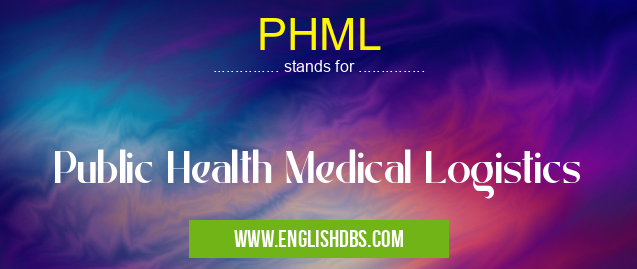What does PHML mean in HEALTHCARE
PHML stands for Public Health Medical Logistics. It is a specialized branch of medical logistics that focuses on the planning, coordination, and management of medical resources and supplies for public health emergencies and other large-scale events.

PHML meaning in Healthcare in Medical
PHML mostly used in an acronym Healthcare in Category Medical that means Public Health Medical Logistics
Shorthand: PHML,
Full Form: Public Health Medical Logistics
For more information of "Public Health Medical Logistics", see the section below.
» Medical » Healthcare
Responsibilities of PHML
- Planning and Preparedness: PHML teams develop comprehensive plans for managing medical logistics in various scenarios, such as natural disasters, pandemics, and terrorist attacks.
- Procurement and Distribution: They identify and procure necessary medical supplies, including pharmaceuticals, medical devices, and equipment, and ensure their timely distribution to affected areas.
- Storage and Inventory Management: PHML manages the storage and inventory of medical resources to ensure their availability when needed.
- Transportation and Logistics: They arrange for the transportation of medical supplies and personnel to and from affected areas, using various modes of transportation, such as airlifts and ground conveyances.
- Coordination and Collaboration: PHML teams collaborate with healthcare providers, emergency response agencies, and other stakeholders to coordinate medical logistics operations and ensure a seamless response.
Importance of PHML
- Disaster Response: PHML plays a crucial role in ensuring the availability of essential medical supplies and resources during disasters, saving lives and reducing suffering.
- Pandemic Preparedness: By developing plans and managing resources, PHML helps prepare healthcare systems for pandemics and other infectious disease outbreaks.
- Emergency Response Coordination: PHML teams coordinate with other emergency response agencies to ensure a unified and efficient response to large-scale events.
- Public Health Initiatives: PHML supports public health initiatives by providing medical supplies and resources for immunization campaigns, disease surveillance, and other preventive measures.
Essential Questions and Answers on Public Health Medical Logistics in "MEDICAL»HEALTHCARE"
What is Public Health Medical Logistics (PHML)?
PHML is a specialized field that manages the planning, coordination, and delivery of medical resources and supplies during public health emergencies. It ensures that essential medical items, such as vaccines, medications, and personal protective equipment (PPE), are available where and when they are needed most.
What are the key responsibilities of PHML professionals?
PHML professionals are responsible for:
- Identifying medical needs during emergencies
- Developing and implementing plans for acquiring, distributing, and managing medical supplies
- Coordinating with healthcare providers, emergency responders, and government agencies
- Monitoring inventory levels and ensuring timely replenishment
- Evaluating and improving PHML systems and processes
Why is PHML important?
PHML plays a crucial role in protecting public health during emergencies by:
- Ensuring that medical resources are available to those who need them most
- Reducing the risk of disease outbreaks
- Improving the efficiency and effectiveness of emergency response
- Mitigating the impact of natural disasters, pandemics, and other emergencies
How can I become a PHML professional?
To become a PHML professional, you typically need a bachelor's degree in a related field, such as public health, logistics, or healthcare administration. Additional education and experience in emergency management, supply chain management, or disaster preparedness are also beneficial.
Final Words: PHML is a vital component of public health emergency preparedness and response. By planning, coordinating, and managing medical logistics, PHML teams ensure the availability and timely distribution of essential medical supplies and resources, saving lives and protecting public health.
